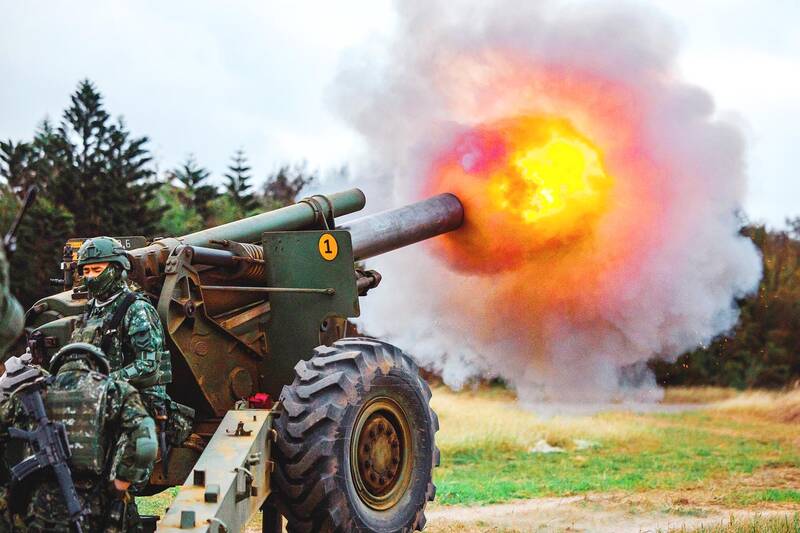The US should create an interagency committee under the president to develop options and plans for sanctioning China in the event that Beijing takes hostile action against Taiwan, a US congressional advisory panel said on Tuesday.
The conclusion was one of 10 recommendations made by the US-China Economic and Security Review Commission in an annual report to the US Congress.
Congress should “enact legislation creating a permanent interagency committee in the executive branch” charged with developing plans for sanctions or other economic measures in the event of “a Chinese attack, blockade or other hostile action against Taiwan,” the report said.

Photo: AFP
The committee would also evaluate the economic and political consequences of the plans and coordinate between agencies to implement them, it said.
It also said that Congress should instruct the Pentagon to draft a report on how the US can bolster its “capacity to resist force” in the event of a Chinese attack and an attempted invasion of Taiwan.
Congress should also make available “significant additional multiyear defense funds” for a planning group of Taiwan and US defense officials to identify “interoperable and complementary capabilities” needed for Taiwan’s defense, and urge Taipei to commit funds to procure its share of those capabilities, it said.
The commission also reviewed developments in Taiwan over the past year in one of the report’s five main chapters.
Discussing the effects of Russia’s invasion of Ukraine, the panel said that China’s main takeaways were likely to be on the importance of managing information, mitigating the impact of potential sanctions and learning from the performance of Russia’s military.
Based on Ukraine’s experience in defending against Russia, Taiwanese leaders might conclude that they must adopt an asymmetric warfare strategy, involve civilians in resistance efforts and build stockpiles of critical materials, the report said.
While Taiwan’s economy showed resilience this year, its vulnerability to Beijing’s coercion has come into greater focus, as the threat of “a Chinese blockade looms over the island’s reliance on imported energy and food,” it said.
The 785-page report also included chapters on Chinese Communist Party decisionmaking, Chinese President Xi Jinping’s (習近平) centralization of authority, US-China economic and trade relations, US-China security and foreign affairs, and Hong Kong.
The commission is an independent government agency comprised of 12 commissioners who are appointed to two-year terms by the majority and minority leaders of the US Senate, and by the speaker of the US House of Representatives.

The Central Election Commission has amended election and recall regulations to require elected office candidates to provide proof that they have no Chinese citizenship, a Cabinet report said. The commission on Oct. 29 last year revised the Measures for the Permission of Family-based Residence, Long-term Residence and Settlement of People from the Mainland Area in the Taiwan Area (大陸地區人民在台灣地區依親居留長期居留或定居許可辦法), the Executive Yuan said in a report it submitted to the legislature for review. The revision requires Chinese citizens applying for permanent residency to submit notarial documents showing that they have lost their Chinese household record and have renounced — or have never

A magnitude 5.6 earthquake struck off the coast of Yilan County at 12:37pm today, with clear shaking felt across much of northern Taiwan. There were no immediate reports of damage. The epicenter of the quake was 16.9km east-southeast of Yilan County Hall offshore at a depth of 66.8km, Central Weather Administration (CWA) data showed. The maximum intensity registered at a 4 in Yilan County’s Nanao Township (南澳) on Taiwan’s seven-tier scale. Other parts of Yilan, as well as certain areas of Hualien County, Taipei, New Taipei City, Taoyuan, Hsinchu County, Taichung and Miaoli County, recorded intensities of 3. Residents of Yilan County and Taipei received

Taiwan has secured another breakthrough in fruit exports, with jujubes, dragon fruit and lychees approved for shipment to the EU, the Ministry of Agriculture said yesterday. The Animal and Plant Health Inspection Agency on Thursday received formal notification of the approval from the EU, the ministry said, adding that the decision was expected to expand Taiwanese fruit producers’ access to high-end European markets. Taiwan exported 126 tonnes of lychees last year, valued at US$1.48 million, with Japan accounting for 102 tonnes. Other export destinations included New Zealand, Hong Kong, the US and Australia, ministry data showed. Jujube exports totaled 103 tonnes, valued at

BIG SPENDERS: Foreign investors bought the most Taiwan equities since 2005, signaling confidence that an AI boom would continue to benefit chipmakers Taiwan Semiconductor Manufacturing Co’s (TSMC, 台積電) market capitalization swelled to US$2 trillion for the first time following a 4.25 percent rally in its American depositary receipts (ADR) overnight, putting the world’s biggest contract chipmaker sixth on the list of the world’s biggest companies by market capitalization, just behind Amazon.com Inc. The site CompaniesMarketcap.com ranked TSMC ahead of Saudi Aramco and Meta Platforms Inc. The Taiwanese company’s ADRs on Tuesday surged to US$385.75 on the New York Stock Exchange, as strong demand for artificial intelligence (AI) applications led to chip supply constraints and boost revenue growth to record-breaking levels. Each TSMC ADR represents